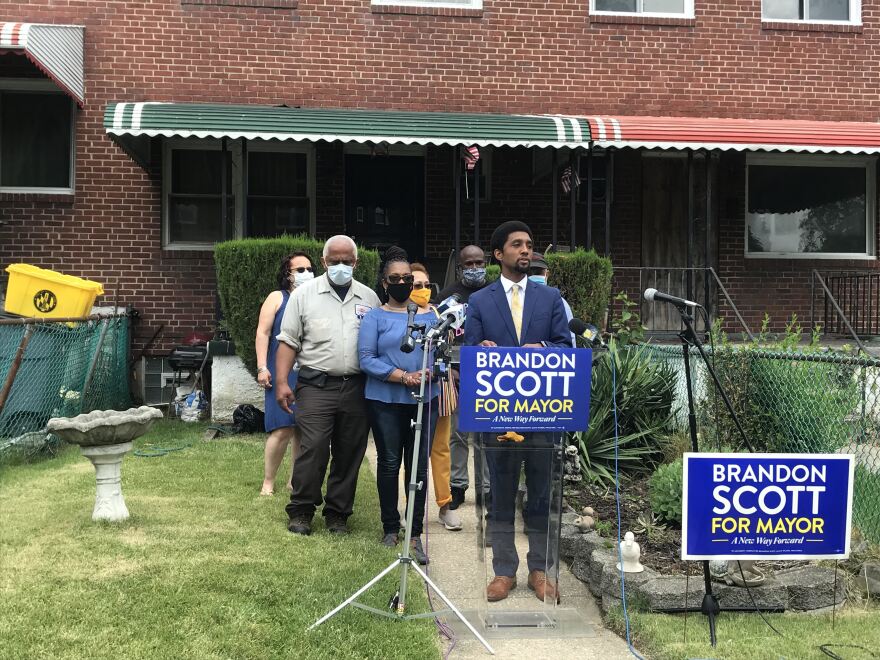Baltimore's newest mayor, Brandon Scott, represents a changing of the guard in Baltimore politics, but the 36-year-old progressive Democrat inherits divides that existed long before the pandemic began.
Scott, the city's youngest mayor in more than a century, campaigned on a platform of building racial equity, professionalizing city government and treating the city's homicide rate — one of the highest in the nation — as a public health crisis.
"Baltimore, like every major city, has problems." Scott said. "But what Baltimore is getting ready to have now is leadership that will not shy away from those problems as someone who has lived and grown up through them."
Scott grew up in Park Heights, a once-robust neighborhood that declined after white flight occurred in the late 20th century. There, he witnessed firsthand the violence that plagues Baltimore, seeing his first shooting before his 10th birthday, as well as the disinvestment that predominantly Black neighborhoods still face. He attended schools with no heat or air conditioning and watched zero tolerance policies tear apart families.
In 2011, at the age of 27, Scott was elected to the city council and spent the next decade passing racial equity, public safety and government transparency legislation. He's called for supervised injection sites and drastic reform to the Baltimore Police Department. He became president of the Baltimore City Council in 2019, after ex-mayor Catherine Pugh resigned amid her self-dealing children's book scheme scandal.

Scott's win represents a changing of the guard, said Roger Hartley, dean of the College of Public Affairs at the University of Baltimore.
"A sweep of progressive, generally younger city council members have been replacing an old guard in the city, who were tied to an old style of Democratic politics that was linked to networks and industry," Hartley said. "But they had never really captured the mayorship."
And in recent years, several Baltimore mayors automatically ascended to the office after their predecessors resigned, some amid corruption scandals.
Scott campaigned in the wake of such a scandal, narrowly beating longtime fixtures of Baltimore politics in the deep-blue city's primary — including former mayor Sheila Dixon, who left office in 2010 after a corruption scandal of her own.
Scott, on the other hand, "can claim that he has full support of the voters that elected him and that this wasn't just a person who got appointed," Hartley said.
Baltimore must re-allocate its budget away from the current dependence on the police department. We must diversify our investments into agencies that focus on proactively developing our young people and communities.https://t.co/aDDa7ySCF1
— Brandon M. Scott (@CouncilPresBMS) June 9, 2020
He also campaigned on an unprecedented platform of curbing mayoral power. Baltimore has what political scientists call a strong mayor system: the office controls the city's powerful spending board and has total power to distribute state and federal funds. Scott has supported legislation to reduce the amount of city council votes needed for a veto override and give councilmembers the ability to move money around the budget, among others.
His plan to combat gun violence, which he has long conceptualized as a public health crisis, involves studying the flow of guns into the city and and implementing a group violence reduction strategy to target the "small group of people committing violence against another small group of people."
It also requires bolstering social services, Scott said.
"That means looking at how we deal with substance abuse, trauma, housing opportunity, especially for those that we know are living in the neighborhoods where the violence is," Scott said.
In Baltimore, that's crucial: the city became the American pioneer for urban segregation policies and practices, when the city passed the first residential racial zoning law in U.S. history in 1910.
"Baltimore never really wrestled with the demons of segregation," said Lawrence Brown, a visiting sociology professor at the University of Wisconsin-Madison.
The legacy of redlining remains painfully present throughout the city today. When Scott steps into the mayor's office, he inherits deep-rooted health, educational and economic gaps in disinvested Black neighborhoods, Brown said.
The pandemic, which has predominantly killed Black Americans and has shuttered job sites throughout the city, is widening these gaps even further.
Leana Wen, Baltimore's former health commissioner and visiting professor at George Washington University, said leaders must redouble their efforts to reduce these disparities, especially as the pandemic worsens.
"There needs to be a lot of work done over the medium and long term while we recognize that racism and racial inequity are public health issues," Wen said.
Scott said he will be unafraid to impose stricter pandemic restrictions in majority-Black Baltimore on things like indoor dining and retail than Maryland Gov. Larry Hogan.
The progressive is also adamant that he's not a savior.
"Am I going to wipe away hundreds of years of inequity in Baltimore? No," Scott said. "But someone has to be the person willing to put the bricks at the foundation of a better city."
Copyright 2020 WYPR - 88.1 FM Baltimore. To see more, visit WYPR - 88.1 FM Baltimore. 9(MDAyNDY5ODMwMDEyMjg3NjMzMTE1ZjE2MA001))




